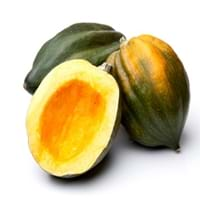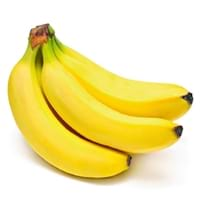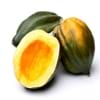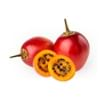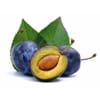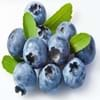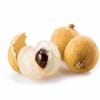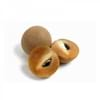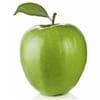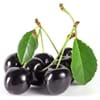एकोर्न स्क्वॉश आणि केळी
फायदे
आरोग्यासाठी फायदे
दाह कमी करण्याचे गुणधर्म, संधिवात उपचार, रक्तातील साखर नियंत्रित करते
कर्करोग प्रतिबंध, अतिसार उपचार, स्नायू वेदना आराम, मूळव्याध उपचार, बद्धकोष्ठता प्रतिबंधित करते, त्वचेची शुद्धता, व्रण उपचार
सामान्य फायदे
रोगप्रतिकार प्रणाली चांगली करण्यास मदत करते, रक्तातील साखरेची पातळी नियंत्रित करते, पचनास मदत करते
रक्तदाब नियंत्रित करते, पचनास मदत करते, निरोगी कोलेस्ट्रॉल पातळी कायम राखते, हाडे मजबूत करते
त्वचेचे फायदे
त्वचेला पोषण देते, ताण पासून त्वचा संरक्षण
वृद्धत्वाची गती कमी करते, त्वचेची पाण्याची पातळी वाढवते, त्वचा टवटवीत करते
केसांचे फायदे
केस गळणे थांबवते, लांब आणि निरोगी केसांना प्रोत्साहन देते, केसांच्या वाढीवर नियंत्रण ठेवते
केस गळणे थांबवते, चमकदार केस, मऊ करणारा मास्क
ऍलर्जी
ऍलर्जी लक्षणे
दमा, लाल पुरळ, तोंड, जीभ किंवा ओठांना सूज येणे
ओटीपोटात वेदना, कमी रक्तदाब, भोवळ येणे, अंगावर उठणार्या पित्ताच्या गाठी, तोंडाची खाज, चक्कर येणे, सूज येणे, तोंड, जीभ किंवा ओठांना सूज येणे, कमकुवत किंवा जलद नाडी, घरघर लागणे
दुष्परिणाम
अतिसार, उलट्या होणे
डोकेदुखी, तीव्र डोकेदुखी, दात किडणे
उपयुक्त आहे
गर्भवती महिला
Yes
Yes
स्तनदा महिला
Yes
Yes
खाण्याची सर्वोत्तम वेळ
जेवणासोबत, उशिरा दुपारी एक नाश्ता म्हणून, जेवण केल्यानंतर खाऊ नका, ताजी फळ खा, दुसरी फळ किंवा खाद्यपदार्थांसोबत खायचे टाळा
उशिरा दुपारी एक नाश्ता म्हणून, रात्री आणि झोपायच्या आधी घेऊ नका, ताजी फळ खा, दुसरी फळ किंवा खाद्यपदार्थांसोबत खायचे टाळा
पोषण
प्रमाण
100 ग्रॅम
100 ग्रॅम
कर्बोदकं
10.40 ग्रॅम
99+
22.80 ग्रॅम
11
तंतू
1.50 ग्रॅम
31
2.60 ग्रॅम
23
साखर
0.00 ग्रॅम
99+
12.20 ग्रॅम
15
प्रथिने
0.80 ग्रॅम
37
1.10 ग्रॅम
21
प्रथिने आणि कर्बोदकांचे गुणोत्तर
0.08
19
0.05
22
जीवनसत्त्वे
अ जीवनसत्व (रेटिनॉल)
245.10 मैक्रोग्रॅम
2
3.00 मैक्रोग्रॅम
32
ब1 जीवनसत्व (थायामीन)
0.10 मिलिग्रॅम
7
0.00 मिलिग्रॅम
99+
ब2 जीवनसत्व (रायबोफ्लेविन)
0.00 मिलिग्रॅम
99+
0.10 मिलिग्रॅम
10
ब3 जीवनसत्व (नायसिन)
0.50 मिलिग्रॅम
30
0.70 मिलिग्रॅम
17
ब5 जीवनसत्व (पँटोथिनिक ऍसिड)
0.30 मिलिग्रॅम
12
0.30 मिलिग्रॅम
12
ब6 जीवनसत्व (पायरिओडॉक्सिन)
0.10 मिलिग्रॅम
15
0.40 मिलिग्रॅम
1
ब9 जीवनसत्व (फॉलीक ऍसिड)
11.00 मैक्रोग्रॅम
24
20.00 मैक्रोग्रॅम
15
क जीवनसत्व (ऍस्कॉर्बिक ऍसिड)
6.50 मिलिग्रॅम
99+
8.70 मिलिग्रॅम
99+
इ जीवनसत्व (टोकोफेरॉल)
उपलब्ध नाही
0.10 मिलिग्रॅम
37
के जीवनसत्व (फायलोचीनों)
उपलब्ध नाही
0.50 मैक्रोग्रॅम
32
लायकोपेन
उपलब्ध नाही
0.00 मैक्रोग्रॅम
9
ल्युटेन + झिआक्सानथीन
उपलब्ध नाही
22.00 मैक्रोग्रॅम
29
चोलीन
उपलब्ध नाही
9.80 मिलिग्रॅम
7
चरबी
0.10 ग्रॅम
99+
0.30 ग्रॅम
28
खनिजे
पोटॅशियम
263.00 मिलिग्रॅम
25
358.00 मिलिग्रॅम
11
लोह
0.60 मिलिग्रॅम
21
0.30 मिलिग्रॅम
35
सोडियम
3.00 मिलिग्रॅम
17
1.00 मिलिग्रॅम
20
कॅल्शियम
26.00 मिलिग्रॅम
17
5.00 मिलिग्रॅम
99+
मॅग्नेशियम
26.00 मिलिग्रॅम
8
27.00 मिलिग्रॅम
7
जस्त
0.10 मिलिग्रॅम
23
0.20 मिलिग्रॅम
14
फॉस्फरस
27.00 मिलिग्रॅम
19
22.00 मिलिग्रॅम
23
मँगनीज
0.10 मिलिग्रॅम
31
0.30 मिलिग्रॅम
15
तांबे
0.10 मिलिग्रॅम
22
0.10 मिलिग्रॅम
22
सेलेनियम
0.40 मैक्रोग्रॅम
13
1.00 मैक्रोग्रॅम
7
चरबीयुक्त आम्ल
ओमेगा 3s
22.00 मिलिग्रॅम
24
27.00 मिलिग्रॅम
22
ओमेगा 6s
13.00 मिलिग्रॅम
99+
46.00 मिलिग्रॅम
35
स्टेरॉल
फायटोस्टेरॉल
उपलब्ध नाही
36.00 मिलिग्रॅम
3
पाण्याचा अंश
89.70 ग्रॅम
13
74.90 ग्रॅम
99+
राख
0.80 ग्रॅम
13
0.80 ग्रॅम
13
कॅलरीज
प्रमाण
100 ग्रॅम
100 ग्रॅम
सोललेल्या फळांमधील उष्मांक
40.00 किलोकॅलरी
31
95.29 किलोकॅलरी
6
न सोललेल्या फळांमधील उष्मांक
उपलब्ध नाही
89.00 किलोकॅलरी
7
गोठलेल्या फळांमधील उष्मांक
39.00 किलोकॅलरी
23
85.71 किलोकॅलरी
7
वाळलेल्या फळांमधील उष्मांक
56.00 किलोकॅलरी
40
105.00 किलोकॅलरी
39
कॅन केलेल्या फळांमधील उष्मांक
40.00 किलोकॅलरी
22
121.00 किलोकॅलरी
3
अन्नामध्ये उष्मांक
रसामध्ये उष्मांक
47.00 किलोकॅलरी
31
100.00 किलोकॅलरी
10
जॅममध्ये उष्मांक
200.00 किलोकॅलरी
26
120.00 किलोकॅलरी
36
पाई मध्ये उष्मांक
200.00 किलोकॅलरी
99+
269.00 किलोकॅलरी
30
वैशिष्ट्ये
प्रकार
बोरासारखे बी असलेले लहान फळ
बोरासारखे बी असलेले लहान फळ, उष्णदेशीय
हंगाम
हिवाळा
बारामही
जाती
बुश टेबल राणी,उत्सव संकरित, काळे लाकुड
कवेन्दिश केळी, लेडी फिंगर केळी, पीसान्ग राजा, विल्यम्स केळी आणि भाजीची केळी
बिनबियांच्या विविधता
No
Yes
रंग
गडद हिरवा, हिरवा-पिवळा, नारंगी हिरवा
हिरवा, पिवळा
आतील रंग
पिवळा
पांढरा
आकार
गोल
वक्राकार दंडगोलाकार
घडण
तंतुमय
मांसल
चव
काहीसा गोड
गोड
उत्पत्तिस्थान
मध्य अमेरिका, उत्तर अमेरीका, अज्ञात
पापुआ न्यू गिनी
वाढ
वेली
झाडे
लागवड
मातीचा प्रकार
पाण्याचा निचरा होणारी
पाण्याचा निचरा होणारी
मातीत pH
5.8-6.8
5.5-7
हवामान
थंड, भरपूर सूर्यप्रकाश असणारा
उबदार
तथ्ये
बद्दल तथ्य
उपलब्ध नाही
- केळीचे मूळस्थान दक्षिण पूर्व आशिया मानल जात.
- केळाच्या झाडाची उंची २ ते ८ मीटर तर याच्या पानाची लांबी हि साडेतीन मीटर असू शकते.
मद्यार्क पेयं मध्ये
मद्य
No
Yes
बिअर
Yes
Yes
स्पिरिट
Yes
Yes
कॉकटेल
Yes
Yes
उत्पादन
अव्वल निर्माते
चीन
भारत
अन्य देश
इजिप्त, भारत, इराण, इटली, मेक्सिको, रशिया, तुर्की, युक्रेन, युनायटेड स्टेट्स ऑफ अमेरिका
ब्राझील, कॅमरुन, चीन, कोलंबिया, इक्वाडोर, घाना, इंडोनेशिया, फिलीपिन्स, युगांडा
अव्वल आयातकर्ता
कोस्टा रिका
युरोप
अव्वल निर्यातदार
युनायटेड स्टेट्स ऑफ अमेरिका
इक्वाडोर
वैज्ञानिक नाव
वनस्पति नांव
चुकर्बिता पेपो
मूसा अकूमीनाटा आणि मूसा बल्बिसियना
प्रतिशब्द
हिवाळी फळांपासून तयार केलेले पेय
मूसा × ड्क्का, मूसा × सेपीडिसीआका, मूसा × सेपीएंटम
वर्गीकरण
डोमेन
युकार्या
युकार्या
राज्य
प्लान्टी
प्लान्टी
उपराज्य
त्रचीओबियोण्ता
त्रचीओबियोण्ता
विभागणी
मॅग्नोलिलोफायटा
मॅग्नोलिलोफायटा
वर्ग
मॅग्नोलिओप्सिडा
लिलिओप्सिडा
उपवर्ग
डिलेन्हिडे
लिलीडे
क्रम
कुकूरबीटेल्स
झीगिबरेल्स
कुटुंब
कुकुर्बितासी
मुसासी
पोटजात
कुकूरबिटा
मूसा
प्रजाती
पेपो
एम. अकूमिनाटा, एम. बल्बिसीअना
सर्वसामान्य गट
उपलब्ध नाही
केळी
|
||
|
||
|
|
||
|
||
|
